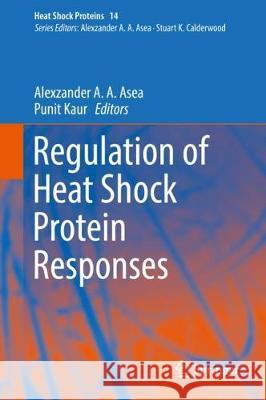Regulation of Heat Shock Protein Responses » książka



Regulation of Heat Shock Protein Responses
ISBN-13: 9783319747149 / Angielski / Twarda / 2018 / 472 str.
Regulation of Heat Shock Protein Responses
ISBN-13: 9783319747149 / Angielski / Twarda / 2018 / 472 str.
(netto: 383,36 VAT: 5%)
Najniższa cena z 30 dni: 385,52
ok. 22 dni roboczych.
Darmowa dostawa!
For easy readability, the book is sub divided into four sections, including, Section I - HSP and Stress Responses;
Dr. Punit Kaur has extensive training and experience in proteomics and mass spectrometry at the Agilent Technologies laboratories. In 2010, Dr. Kaur received full certification as a BD FACSAria Operator. In 2014, Dr. Kaur is currently working as the Visiting Scientist Professor to The University of Texas MD Anderson Cancer Center, Houston, TX. Dr. Kaur’s main research focus is on the use of hyperthermia in combination with radiotherapy and chemotherapy, known as the triple-modality approach in the treatment of triple-negative breast cancer (TNBC). Dr. Kaur has published more than 40 scientific articles, book chapters and reviews. Dr. Kaur currently serves as Editorial Board Member for European Cancer Prevention and the Journal of Proteomics & Bioinformatics. Recently, Dr. Kaur has been selected as an Editor for Proteomics and Biomarkers, a special issue of the Journal of Proteomics & Bioinformatics. Dr. Kaur is also an Editor for 5 books entitled “Heat Shock Protein” by Springer Nature Publishers. Dr. Kaur has also been session and co-session chair for Society of Thermal Medicine and Cell Stress Society International. Dr. Kaur has also played an important role in the Scientific and Organizing Committee member for Cell Stress Society International. Dr. Kaur has played a major role in the advisory responsibilities and mentorship of 15 Undergraduate Students, 55 International Exchange Undergraduate Students, 2 Graduate Students, 4 Postdoctoral Scholars and 2 Medical Residents. Dr. Kaur has been involved in didactic teaching and laboratory courses and Grants Writing, Research Methodology and Problem-Based Learning Techniques.
Professor Dr. Alexzander A. A. Asea is a highly innovative and accomplished world-renowned clinical and basic research scientist and visionary executive leader who have exceptional experience spearheading strategic planning, clinical and basic science research, training, education and commercialization initiatives within top-ranked hospitals and academic biomedical institutes. Prof. Asea’s initial findings studying the effects of Hsp72 on human monocytes lead to the proposal of a novel paradigm; that Hsp72 previously known to be an intracellular molecular chaperone, can be found in the extracellular milieu where it has regulatory effects on immunocompetent cells. Prof. Asea has authored over 255 scientific publications including peer-reviewed articles, reviews, books, book chapters, editorials and news headliners in a wide range of biomedical related disciplines. He has also successfully obtained grant funding from the federal government, industry, philanthropic organizations, local business and community groups. Prof. Asea is the Series Editor of the widely successful book series Heat Shock Proteins (Springer Nature Publications) and is on the Editorial Board Member of 13 scientific peer reviewed other journals. Currently, Prof. Asea is at The University Of Texas MD Anderson Cancer Center, Houston, USA.
The book Regulation of Heat Shock Protein Responses provides the most comprehensive review on contemporary knowledge on the regulation of HSP responses and its consequences to human diseases and disorders. Using an integrative approach to understanding the regulation of HSP responses, the contributors provide a synopsis of novel mechanisms by which HSP responses are regulated under normal physiological and pathophysiological conditions. Key basic and clinical research laboratories from major universities and academic medical hospitals around the world contribute chapters that review present research activity and importantly project the field into the future. The book is a must read for researchers, postdoctoral fellows and graduate students in the fields of Translational Medicine, Human Physiology, Biotechnology, Molecular Medicine, Infectious Diseases and Pathology.
1997-2026 DolnySlask.com Agencja Internetowa
KrainaKsiazek.PL - Księgarnia Internetowa









